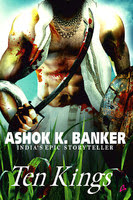"Ten Kings" by Ashok K. Banker. This book is published by Amaryllis in Aug 2014 and has 340 pages. This book has its origins in Rigved. The war happened more than 4000 years ago.
Sudas was the king of tribe Trtsu Bharata. He ruled area of five rivers, today's Punjab. His kingdome was on the river Parusni. He was advised by Guru Vashistha. Anu was the king of Anu tribe (another Bharata tribe) who shared space with Trtsu Bharatas on Parusni river (today's Ravi) and had an uneasy relationship with Trtsu Bharata over sharing of river Parusni. Vishwamitra was the Guru of Anu's. He was also half brother of Sudevi, Sudas' wife. Indra was patron god of all Bharata tribes.
Anu forms an alliance with five other kings from Bharat Varsha and four foreign kings and these Ten Kings (Dasarajna - दशराजन्) decide to annihilate Trtsu Bharata tribe and plunder the spoils. These Ten Kings are: Anu, Alinas, Puru, Bhrigu, Druhyu, Bhalana, Dasya, Matsya, Parsu & Pani. Last four are Mleccha (Barbaric foreigners) who came from Pariyatra Parvat Pass (called Khayber pass today). Odds are stacked decisively against Sudas. His army of less than 500 is outnumbered by the Ten Kings army of Six thousand, which actually turn out to be more than 30,000.
Sudas decides to fight the battle for his dream of united Bharat Varsh (भारत वर्ष) on the banks of Parusni river on a stormy day. His only hope is advice of Guru Vashishtha, strategy, bravery, element of surprise and weather. How many hours can Sudas sustain? Will he survive? Will he retain his honor? Who will win? Does the thunder god Indra and rain good Varun help him?
Sudas fights valiantly. His men support his trust in them. They use the terrain to their advantage. They use natural resources to their advantage. They employ psychological warfare. They use weather to their advantage. (Did you think of 'Art of war' by Tsun Tzu? This was much before him.) Trtsu achieve impossible feat through determination, bravery and trust in their king and Guru. It also underlines the fact that ancient Indians possessed the knowledge to make use of elements through the study of mathematics, science, geography, almanac and astronomy.
It was probably the first ever war fought with iron weapons. Opposition considered them godly weapons (दैवी अस्त्र) handed over to Trtsu by Indra himself. Weather played an important part in the war, again considered intervention by Gods. It was a war of Sudas Vs Ten Kings, Good Vs Evil, Vashistha Vs Vishwamitra, Civility Vs Barbarism.
Emperor Sudas established a city after winning the war. A city distinguished by greatly advanced civic and social development. This city is HARAPPA of Indus Valley Civilization. Emperor Sudas can thus be termed as founding Father of Bharat.
All counting in this book is in scores (1 score = 20 numbers). He has successfully created an atmosphere of more than 4000 years ago. The description of war and tactics is vivid. You can actually visualize the war and positions of the armies. Kudos to the author for writing this tantalizing historical fiction based on just two verses from 7th mandala of Rigved and archeological findings. It's neither pure history not pure fiction. Author calls it historical fiction. This book can be made into a riveting film.
Why is this story so significant? Because this battle can be considered first known invasion of India. Had the Ten Kings won, we might have been ruled by tribes from Iran, Syria, Afghanistan and European steppes today.
An excellent book. A must read.

